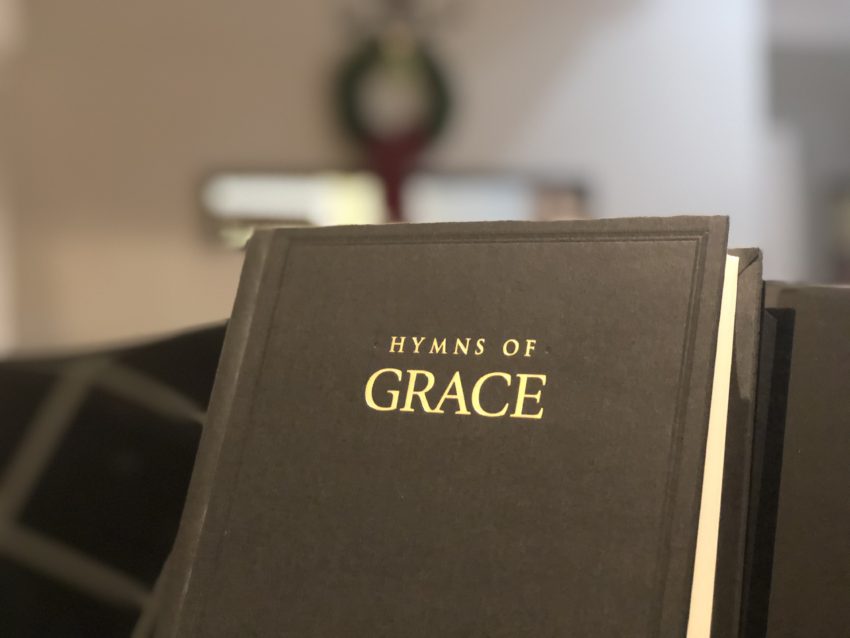During this Advent season, it is my desire to prepare my heart through a variety of “Hymns of Grace.” For many folks, Christmas time is a beloved and cherished season and the traditional sounds of the seasons often set the mood and bring to remembrance cherished memories. Music and song play an important role in preparing the heart to encounter the Lord. “Music is a gift to help fix the hearts of worshippers upon God.”1
Today’s hymn is Of the Father’s Love Begotten. When people say they like the old hymns, I often wonder about their definition of “old.” For some younger people, an old hymn or worship song dates back to the year 2000. That is ancient history for some people. Think about it. The iPhone did not even exist until January 9, 2007. For an older generation who often decry the lack of old hymns in worship, they usually refer to hymns that date back to the early 1800s to the early 1900s. There are many “old” hymns, and unfortunately, the recent “old” hymns and the really “old” hymns have fallen off the order of worship in thousands of contemporary churches. Today’s hymn text dates back to the 400’s and the tune is from the 1200s, although it was not translated from Latin into English until the mid-1800s. I suppose this “old” hymn covers both the recent and really old categories.
What is particularly important about this hymn is the doctrinal emphasis it provides on the deity and humanity of Christ, along with the concept of the Trinity. The author of the text was Marcus Aurilus Clemens Purdentuis (c. 348-413 Spain). During his day there was a controversy among the church called the Arian controversy.
In the early fourth century, one of the greatest controversies in the church came to a breaking point, and the Emperor Constantine called together the First Council of Nicea to establish once and for all the Church’s official stance on the nature of the Trinity. The council condemned the teaching of Arius, who believed that Jesus was not of the same nature as God the Father. The Nicene Creed was thus written as a statement of faith that God the Father, God the Son, and God the Spirit are all of the same nature, three and yet one. Prudentius’ hymn, “Of the Father’s Love Begotten,” addresses this belief in the Trinity in the very first line. It is very clear from his text that Christ is both human and divine, and rather than simply being made by God, he was “begotten” of the very same substance. As we sing this hymn, we both affirm and align our faith with the broader faith of the Church, and we deny any belief that says that Christ is not fully divine. This hymn, so often associated with Christmas, is thus a hymn of proclamation, calling us to sing out our faith – “every voice in concert ring, evermore and evermore!”
Oh, that churches today could hear each worshipper sing “every voice in concert ring, evermore and evermore!” The Hymns of Grace hymnal only includes three (1,4,5) of the five verses. The original text had nine. Below are the five doctrinally rich verses that can prepare the heart and inform the mind during the Christmas season.
1 Of the Father’s love begotten
ere the worlds began to be,
he is Alpha and Omega,
he the source, the ending he,
of the things that are, that have been,
and that future years shall see
evermore and evermore.
2 Oh, that birth forever blessed
when the virgin, full of grace,
by the Holy Ghost conceiving,
bore the Savior of our race,
and the babe, the world’s Redeemer,
first revealed his sacred face
evermore and evermore.
3 This is he whom seers and sages
sang of old with one accord,
whom the voices of the prophets
promised in their faithful word.
Now he shines, the long-expected;
let creation praise its Lord
evermore and evermore.
4 Let the heights of heav’n adore him,
angel hosts his praises sing,
pow’rs, dominions bow before him
and extol our God and King.
Let no tongue on earth be silent,
ev’ry voice in concert ring
evermore and evermore.
5 Christ, to thee, with God the Father,
and, O Holy Ghost, to thee
hymn and chant and high thanksgiving
and unending praises be,
honor, glory, and dominion
and eternal victory
evermore and evermore.
Below are some links to traditional and contemporary versions of this hymn. Leave a comment on what version you like.
Consider leaving a comment on how your heart and mind have been prepared during this Advent season by this post.
Traditional
Traditional
Contemporary
Contemporary
1 Clark, Kevin, et al. The Liberal Arts Tradition: A Philosophy of Christian Classical Education. (Classical Academic Press, 2019) 223.
2 “Of the Father’s Love Begotten.” Hymnary.org, https://hymnary.org/text/of_the_fathers_love_begotten. Accessed November 29, 2021.

